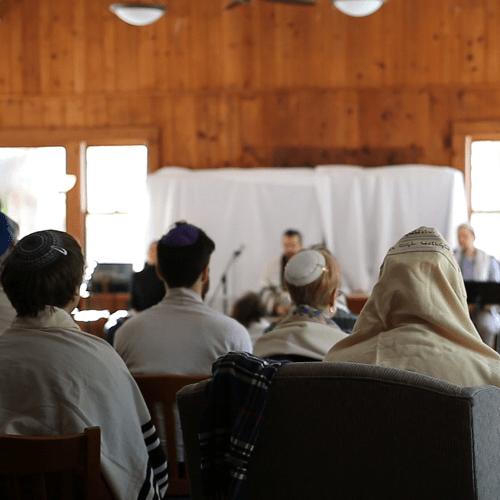by Rabbi Jay Michaelson
Why do mindfulness meditation in a Jewish context?
These days, there are seemingly endless ways to meditate: in secular contexts, like mindfulness-based stress reduction; in a wide variety of Buddhist communities; at yoga classes. So why do Jewish?

It’s not because Jewish meditation practices are better, holier, or more effective than any others. Believe me, I’ve studied them for twenty-five years. There are some uniquely Jewish practices that can be helpful for some people – Rabbi Nachman of Bratzlav’s hitbodedut comes to mind – but in fact, Buddhist traditions, coming from a tradition which placed meditation at the center of monastic life for two thousand years, actually tend to be more fully developed than Jewish ones, which don’t. That’s why, at the Hazon Meditation Retreat, we tend to focus on Buddhist-derived meditation practices like mindfulness and open awareness, and blend them with Jewish practices like davening and Shabbat.
But there are a lot of reasons to meditate in a Jewish context, whether you’re Jewish or not. Here are four.
First, there’s a powerful cultural resonance. Whether Judaism is in my genetic DNA or not, it’s definitely in my cultural DNA. Jews have special joys and oys; uniquely beautiful and tragic communal histories (and traumas); particular ways of being in the world; common languages. We don’t all share the same languages and histories, and many of us have been excluded from some of them. But for some of us, the Jewish cultural frame can be deeply comforting, helpful, and conducive to deep spiritual work. As one of our teachers used to reply, when someone would ask “what’s Jewish about this practice”: we are.
Second, the Judaism I choose to practice is a way of being in relationship with that which is beyond my personal concerns and my human, self-centered nature. Judaism gives form to my life and a shared community of meaning with which to shape the sacred moments of life. As a rabbi, I love sharing those with others. Jewish practice has also given me ways to encounter what some call the sacred or holy aspect of human experience. This way of being in the world is accessible all the time, but for reasons quite similar to the teachings of the Buddha, it’s difficult to access, because at almost all waking moments, the mind is busy going somewhere else. As Rabbi Nachman of Bratzlav said: “The world is full of light and mysteries both wonderful and awesome, but our tiny little hand shades our eyes and prevents them from seeing.” In this context, meditation is one way to cultivate wonder at and gratitude for being alive – and that I take to be a highly Jewish (and Western) spiritual goal.
Third, when they come home from retreat, many people find that meditation can enhance religious practices that integrate really well into daily life, whether it’s lighting candles on Friday night, or working on one’s ethical conduct, or ‘showing up’ for moments in the life cycle. In Jewish and Kabbalistic traditions, meditation was often used as a preparation for other practices—prayer and Torah study, for example. The quiet mind absorbs sacred text much more readily than the busy mind does, and the presence of mind that comes from mindfulness (not a traditional Jewish form, though certainly a contemporary one) also enables a richer, juicier gratitude for life’s many blessings. That’s why mindfulness has found its way into so many synagogues and services. It makes life juicier.
Finally, at our retreats, we’re not just using Buddhist technologies for Jewish ends. Rather, as Jews have done for thousands of years – consider the bagel, or cantorial music, or our Biblical myths – we are blending, remixing, and transforming elements from diverse traditions. To put it another way, we’re not just sitting quietly in order to have a powerful spiritual experience – although that does often happen. Rather, in the words of my teacher and friend Sylvia Boorstein, “we’re sitting quietly with the intention to notice those characteristics of heart and mind that lead to unhappiness, and those that lead to happiness, and therefore ‘choose life.’ This is not just a groovy way to alter your consciousness, or feel a little bit high or a little bit relaxed, but really to see deeply into the nature of your own character and—whatever language you want to use—the glory of God, or the wonder of creation, or the awesomeness of being alive, and to have that vision transform you into the kindest and most courageous person that you can be for the duration of your lifetime.”
As usual, Sylvia put it perfectly. Whether you have a Jewish religious practice or are purely a ‘bagel-and-lox Jew’; whether you’re Jewish by birth, a Jew by choice, in a multi-faith relationship, or just Jew-curious; whether you love the richness of the Jewish tradition or have often felt excluded from it (or both!), we invite you to join our warm, pluralistic Jewish community of seekers, finders, and contemplatives.




Comments are closed.